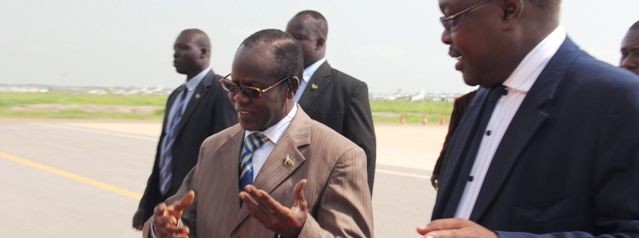The SPLM-IO faction led by Riek Machar have dropped their demand for President Salva Kiir to step down but now propose instead the removal of Vice President James Wani Igga as well as the elimination of the vice presidency itself.
Igga was appointed vice president in August 2013, a month after President Salva Kiir sacked his deputy Riek Machar. He belongs to the same party as Kiir but hails from a different region of the country, Central Equatoria.
Now the armed opposition faction SPLM-IO is calling for his removal as part of a power-sharing deal that is being negotiated at peace talks in Addis Ababa, Ethiopia.
“We believe that the positions of the Vice President and the two deputies to the Prime Minister will complicate the working relations between the two principals [Kiir and Machar] and therefore should be expunged from the government structure,” SPLM/A-IO chief negotiator Taban Deng announced on Monday.
Taban argued that SPLM-IO has already made “strategic concessions” on the issue of the powers of the Prime Minister, during the most recent talks held at the IGAD Summit meeting in Addis Ababa late last week.
In particular, SPLM-IO conceded their earlier demands that Riek Machar should be considered head of government and chair the Council of Ministers.
“This means that we have given him [Kiir] everything. He is now the head of state and the head of government. We have nothing to concede more,” said Taban Deng at a press conference in Addis Ababa on Monday.
He noted that Salva Kiir’s negotiators have proposed that the leadership of the transitional government should consist of a president, vice president, prime minister and two or three deputies to the prime minister.
Taban opposed this structure saying it would “lead into confusion,” adding, “too many cooks spoil the broth.”
He called on Kiir’s party to make ‘sacrifices’ to reciprocate SPLM-IO’s concessions and bring peace. He compared the proposal to remove Igga to a Sudanese precedent, in which the vice president in 2005 was demoted in order to bring rebel leader John Garang into the government.
“We have given the example of the CPA [Comprehensive Peace Agreement]: Ali Othman was the First Vice President. But because President Bashir wanted peace in his country and he wanted the war to end he has to make that big sacrifice, removing Ali Othman and putting John Garang in his place.”
Taban Deng suggested that Igga could return to the parliament after his removal from the vice presidency: “The current vice president was the Speaker of the Parliament, and as you know Speaker of Parliament is a very high position.”
It is not yet clear whether Igga’s position is a red line for SPLM-Juba negotiators or instead some might be open to considering the proposal.
Igga was reportedly not Kiir’s first choice for the vice presidency; the current health minister Riek Gai Kok was approached to accept the position but declined.
The vice president has also been in tension with some leading Equatorian politicians. During a dispute within the ruling party in July, involving Equatorian proponents of federalism, Igga was referred to derisively by another very senior Equatorian politician who implied that he was a mere puppet of the president.
Igga is from Central Equatoria but he is not from the state capital Juba, instead hailing from Lobonok Payam south of the city.
The SPLM-Juba faction headed by Salva Kiir is yet to make a public response to the proposal to remove the position of vice president, though Igga himself has previously said he is not willing to stand aside for Riek Machar to take his place.
On a related matter, it is unclear whether the negotiators have yet discussed options for the line of succession for the proposed transitional government. Taban Deng’s proposal did not specify whether, in the absence of a vice president, the Prime Minister would be next in line for the presidency.
Such a line of succession would be unacceptable to the SPLM-Juba negotiators because it would put Riek Machar second in line to the presidency.
Meanwhile, the spokesman for the SPLM-Juba delegation Michael Makuei told press on arrival at Juba Airport yesterday that the two sides made progress in the most recent talks in Addis Ababa.
He said the talks were adjourned until 25 November to allow for further consultations on the proposed structure of the transitional government. In the meantime, a joint security committee will begin meeting to discuss implementation of the cessation of hostilities agreement.
File photo: James Wani Igga



